This post has already been read 1706 times!
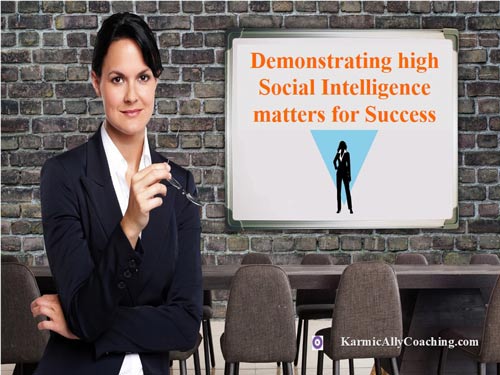
When you have a “run in” with someone whether it is a heated argument or just a subtle confrontation, do you find yourself getting wrapped up in your own emotions and assuming a position of defensiveness?
Or do you separate yourself from the emotion of the situation and put yourself in the other person’s shoes trying to see the world as they see it?
Most people opt for option #1 not because they want to, but because they are unaware that there is a better, more rewarding option.
As important as Intelligence Quotient and Emotional Intelligence or Emotional Quotient are for achieving success in our lives and careers, there’s one crucial area many people never think about or discuss – the idea of Social Intelligence.
In his book, Mastery, Robert Greene defines social intelligence as “the ability to see people in the most realistic light possible”.
In other words, social intelligence is all about reading other people and figuring out the reasons why they behave the way they do. Think of it as your ability to think from another person’s perspective.
It’s human nature to be self-absorbed and to try projecting our emotional needs or views on others and then misread their intentions and create more confusion with our reactions.
But when we move past our self-absorption and learn to focus on others, read their behavior and what drives them we can contribute to creating a win-win outcome.
Greene breaks this into two kinds of knowledge: specific knowledge of human nature — the ability to read people, to get a feel for how they see the world, and to understand their individuality, and the general knowledge of human nature, which means accumulating an understanding of the overall patterns of human behavior that transcend us as individuals, including some of the darker qualities we often disregard.
Some of the best examples I’ve seen or read about in relation to high Social Intelligence include one of my bosses who knew the names of everyone in the office right down to the cleaning lady and would greet each one of us in the morning.
He knew what made us tick, what drove us and how to tie it into the annual targets and goals for our office and keep the Regional Head happy. It wasn’t just us, he was popular with our creditors and clients too!
And it isn’t just him. Socially intelligent leaders like A.G. Lafley who took over as CEO of Proctor and Gamble in 2000 know how to take a down in the dumps low morale employees to new aspirations that are aligned with the company vision and turn around results.
I love the story of how he told the employees to get the “moose” (i.e. the problems they’d been afraid to make public) out of the closets and onto the conference room tables where together they would solve them.
He showed respect for their views and put into practice those ideas that he thought were best. No wonder the stock price of the company rose by 70% under his stewardship.
It was the same with our boss. Monday meetings were never meant to berate us. Instead we brainstormed on how to meet our targets and the entire office worked together to achieve it.
Some of the worst examples of low social intelligence that I’ve seen are on Facebook where some people forget the reach of their posts and comments. They shouldn’t wonder why they’re being unfriended or kicked out of Groups.
A quick clarification about Emotional Intelligence and Social Intelligence – when they come together, they form ESI or Emotional and Social Intelligence – the ability to be aware of our own and others’ feelings – in the moment – and use that information to lead yourself and others (Institute for Social + Emotional Intelligence).
While they may sound similar, there is a difference in terms of timing and purpose.
Social Intelligence is about the future and determining the best way for us to get along and create a favorable outcome to any situation.
Think of it this way. There are people in the office who have the best possible qualifications and considered intelligent.
But the ones who are unpopular or have strained relationships with others are usually lacking in people skills and tact (ever been shocked at feedback that was so blunt that you wanted to crawl into a hole? Perhaps if you had received constructive criticism, you might have taken that feedback seriously?). These people would be considered as lacking or having low social intelligence.
Emotional Intelligence on the other hand is more about the present and closely related to emotions and feelings. It involves self-awareness as well as social awareness and an ability to understand the other person’s perspective using skills of empathy and perceptual positions.
What defines your Social Intelligence rating?
Psychology Today states social intelligence “…develops from experience with people and learning from success and failures in social settings.
It is more commonly referred to as “tact,” “common sense,” or “street smarts” and is mostly learned.
The magazine describes critical traits for people with high Social Intelligence:
- They can carry on conversations with a wide array of people and verbally communicate with appropriate and tactful words, also known as “social expressiveness skills.”
- They are socially sophisticated, adept at learning how to play different social roles, and well-versed at the informal rules of the game that are the creed of social interaction.
- They’re known to be effective listeners.
- They know how to efficiently analyze what makes people tick by paying attention to what they’re saying and how they’re behaving.
- Not only do they know how to learn to play different social roles; they put those skills into practice to feel at ease with many different types of personalities.
- They take care of the impression of themselves they exude on other people.
As you develop your social intelligence, you will find that you naturally become more persuasive and appealing to people of all kinds of personality types.
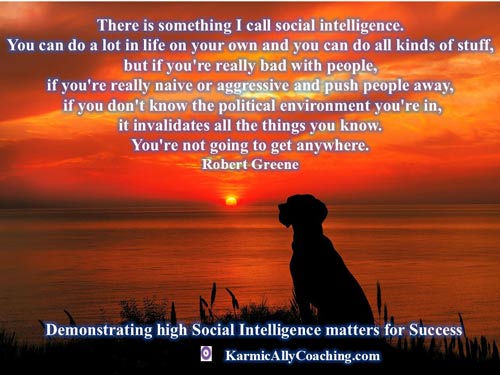
Instead of trying to force your ideals and opinions on someone who’s view of the world doesn’t match yours, you alter your approach to appeal to their nature.
It doesn’t mean you have to sacrifice your own beliefs and adopt theirs, it just means that you choose to suppress your opinion because you know it is a useless battle to enter.
For example, if someone is ranting and raving about a political or cultural issue, and you don’t agree at all, you let them sound off and hold your opinion to yourself. You can let them blow off some steam and just reply with something like, “I can see why that would be frustrating.”
Remember my reference to Facebook comments? Sometimes they lead to full blown wars with everyone wanting to have the last word with everyone losing the essence of the original comment.
Again, you don’t have to agree with them and compromise your own beliefs, but you also are not required to share your opinion.
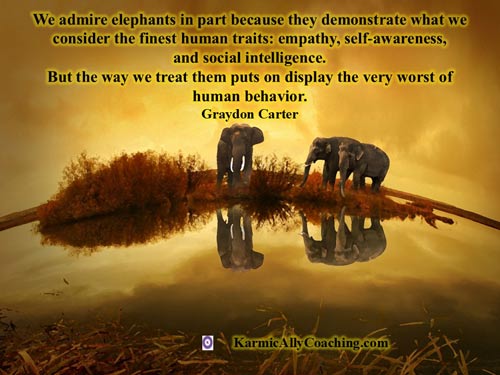
Something very powerful happens when you choose this approach. You get to study and examine how this person thinks, what makes them tick, what makes them get emotional. You can use all of these triggers as ammo when you are dealing with them in the future.
Knowing this information, you can customize your approach when you deal with them in the future. If you need a favor or if you have to do a project with this person, you will be in a much stronger position to persuade them and speak/behave in ways that will win them over.
So the next time you come across someone who rubs you the wrong way or has a difficult personality, use it as an opportunity to enhance your social intelligence and you will gain more personal power than you had before.
This power will only continue to grow the more you use it!


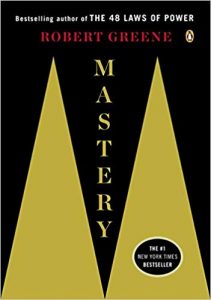
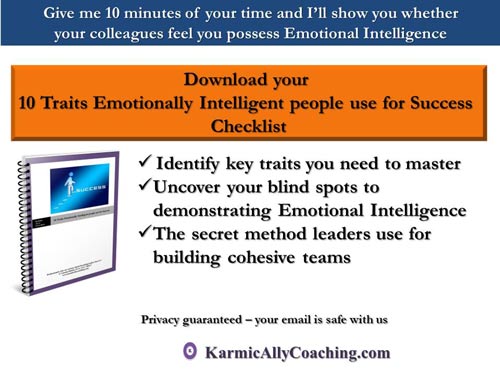

 I adhere to the Certified Coaches Alliance Code of Ethics and Standards. A copy is available on request.
I adhere to the Certified Coaches Alliance Code of Ethics and Standards. A copy is available on request.
 Let's Talk through the Connect Form:
Let's Talk through the Connect Form:
Hey Vatsala, this is such a wonderful article full of great information. I think I havent read this book by Greene. But you have sparked my curiosity…shall add it to my reading list.
Delighted to have made a recommendation for your reading list, Zeenat. Worth a re-read because one finds new insights on a second read.
Interesting! Thank you for sharing this wisdom, could definitely be helpful in any situation.
Thanks Kris. Social intelligence is becoming relevant in the corporate world and has always been relevant in our private lives.